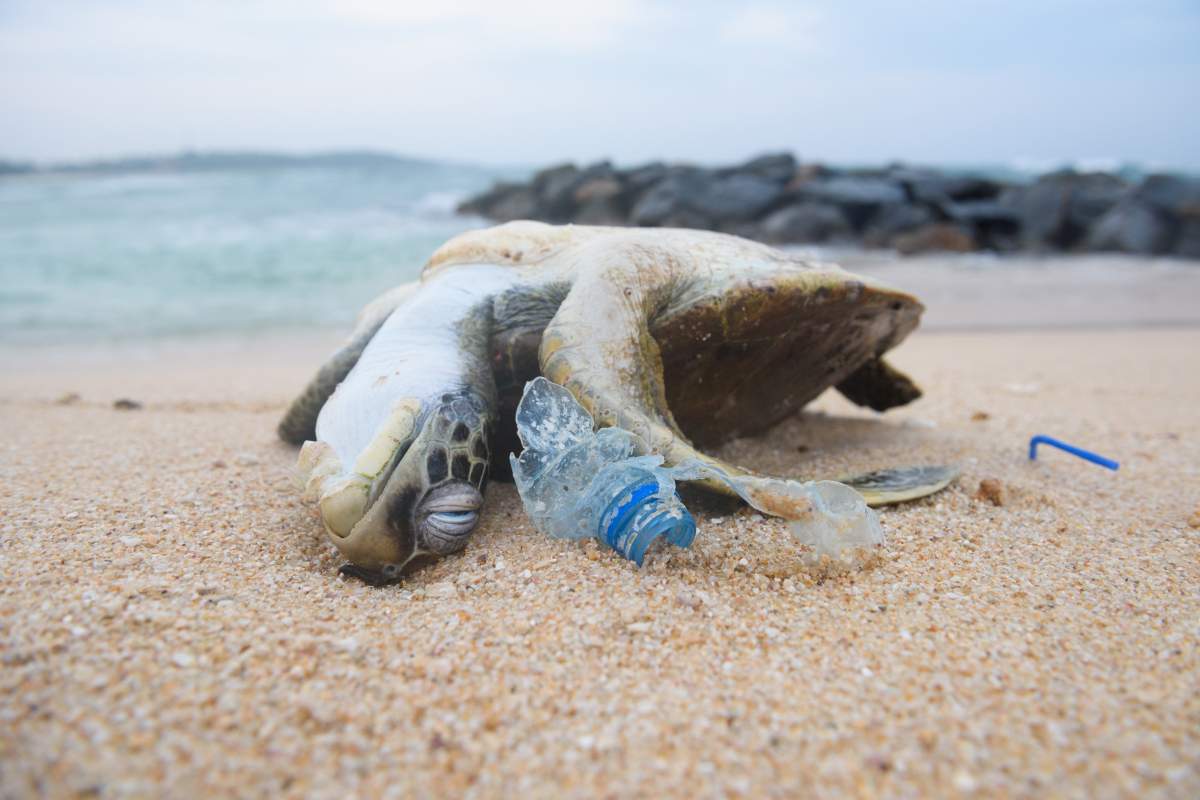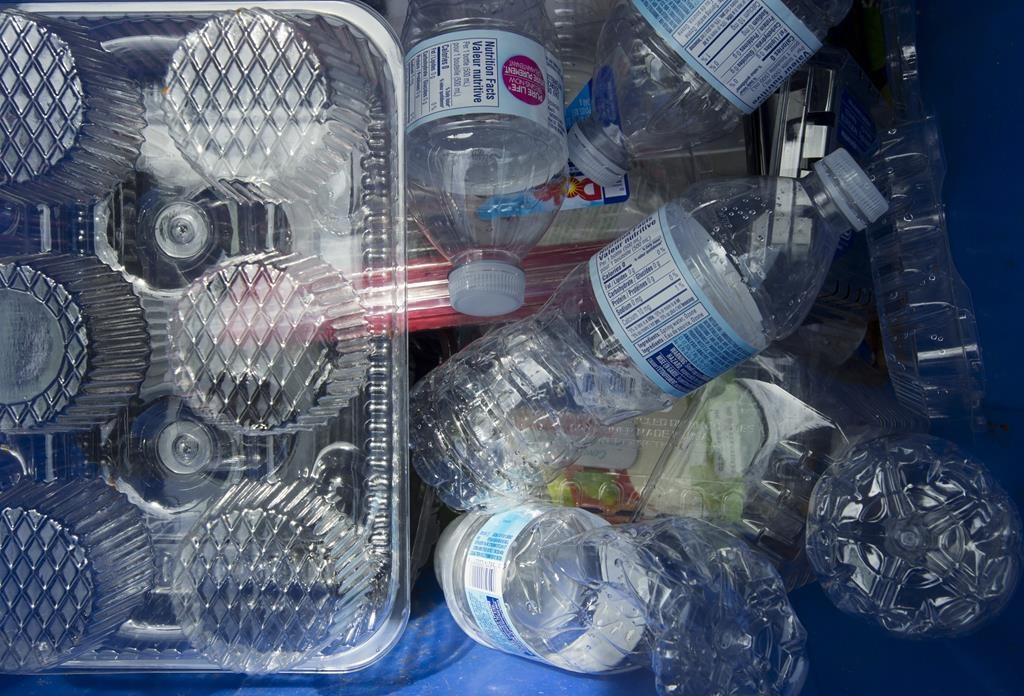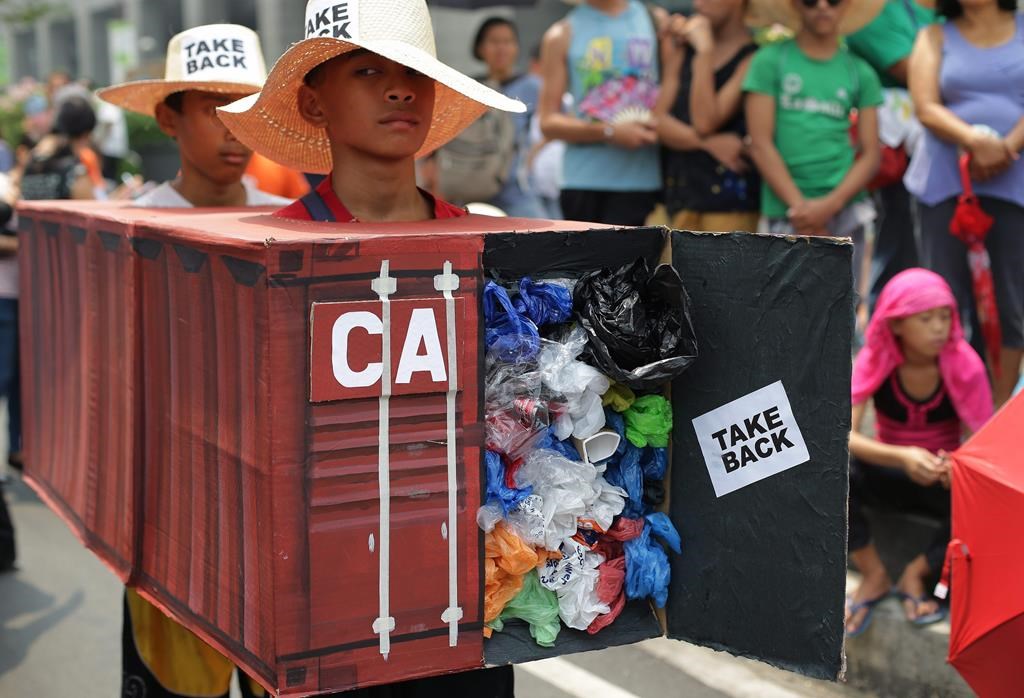Chelsea Rochman has spent the past decade studying the insides of fish. What she’s discovered shouldn’t be there.

“We find microplastic in every single fish we pull out of the Great Lakes,” she said. “Sometimes (there are) hundreds of pieces in the stomach.”
Rochman, a professor of ecology and evolutionary biology at the University of Toronto, said the amount of plastic waste released into the environment each year is a “huge problem” that needs a solution now.
A paper she co-authored with other researchers published in the journal Science last September estimates that between 24 and 34 million metric tonnes of plastic was released into the world’s oceans, lakes and rivers in 2020. If plastic use doesn’t change, this figure could rise to 90 million tonnes a year by 2030, Rochman said.
“Our plastic waste is everywhere,” she said. “It litters our coastlines, it litters the deep ocean … it’s in the sediments, it’s in the river systems.”
Plastic production is big business for Canadian manufacturers. A 2019 study by Environment and Climate Change Canada estimated that $10 billion worth of “virgin” or “primary” plastic is made in Canada each year. Nearly 80 per cent of this is exported, mostly to the United States.
The same study found that only about nine per cent of plastics used in Canada are recycled. Canadians dispose of about 3.3 million tonnes of plastic every year and the vast majority of this either ends up in landfills or in the environment.
This waste threatens marine life, such as turtles, fish, whales, penguins and other sea birds, and can poison local ecosystems, Rochman said.
Prime Minister and Liberal Leader Justin Trudeau vowed to ban some types of single-use plastics by the end of 2021 and to significantly reduce plastic use by 2030. So far, none of this has been achieved.
Now, with a federal election campaign underway — and with each party offering something different — the fate of these promises hangs in the balance.
Ban on single-use plastics
In October 2020, Environment Minister Jonathan Wilkinson, who’s running for re-election in B.C., announced a list of six single-use plastics that would be banned by the government. The list included: grocery bags, straws, stir sticks, six-pack rings (the kind used for beer), cutlery, and food takeout containers made from hard-to-recycle plastics.
Wilkinson said the government would seek to regulate the plastics industry and ban these single-use items by the end of 2021. To do this, the government designated “plastic manufactured items” as “toxic” under the Canadian Environmental Protection Act (CEPA).
Wilkinson said a Liberal government, if re-elected, will follow through on its promise to ban these items by the end of 2021. He also said the list of banned items could be expanded.
“The way in which we arrived at that was looking at things that were either very difficult or very costly to recycle, that were harmful in the environment, and for which there were readily available alternatives,” Wilkinson said.
Green Party candidate Paul Manly, running for re-election in B.C., said Wilkinson’s promises don’t go far enough.

Get breaking National news
Manly said a Green Party government would immediately ban all forms of single-use plastic — not just the six items currently listed by the government — and would end federal subsidies to the oil and gas sector, which is a key player in plastics manufacturing.
“We think that single-use plastics just need to be eliminated,” Manly said.
The NDP also says it will immediately ban all “wasteful single-use plastics” and end oil and gas subsidies. This means the NDP would not ban plastic items used for medical equipment.
Laurel Collins, an NDP candidate running for re-election in B.C., criticized the Liberals’ decision to ban just six types of single-use plastic.
She also said the government’s decision to call an election now — when its work on banning plastic waste had just begun — was rooted in political selfishness, not environmental policy.
“We are seeing waste and plastic waste in our waterways, we’re seeing it inside of animals and inside of human bodies,” Collins said. “It’s impacting our health. It’s essential that we reduce waste in our landfills and in our communities.”

The Conservatives, meanwhile, aren’t committed to banning any kinds of single-use plastics.
The Conservative platform, which includes details about the party’s plans for plastics, takes aim at what it calls “showy bans” and “declarations” made by the Liberals on plastics.
Dan Albas, a Conservative candidate running for re-election in B.C., said an O’Toole government would work with manufacturers and retailers to reduce plastic waste by ensuring more items are recycled. The party hasn’t, however, provided any specific details of how this would work.
Albas also said the Liberal government’s decision to designate all “plastic manufactured items” as harmful under CEPA is too broad and could lead to certain types of plastics being banned that are essential for both medical and non-medical uses.
“The same molecules that are in a single use application like a fork are the same molecules used in a medical application,” Albas said.
Albas’ perspective is similar to an industry group made up of plastic manufacturers that is suing the federal government for declaring plastic toxic under CEPA. The group says waste management is a provincial jurisdiction and that banning single-use plastics is not based on science.
Reduce, reuse, recycle
Banning single-use items isn’t the only approach to eliminating plastic waste.
Each of the four party platforms talks about the importance of recycling and building a “circular economy” for plastics in Canada and North America.
The Liberals have vowed that if they’re re-elected, all new plastics made in Canada will contain at least 50 per cent recycled materials by 2030. Wilkinson said this approach will create a “marketplace” for these materials and encourage manufacturers to produce plastics that are easily recycled.
“Everybody knows that we can’t keep sending this amount of plastics into our landfills,” Wilkinson said. “That’s just awful. And I think we all know it and we all feel guilty about it.”
The Conservatives agree that more plastic needs to be recycled.
But how this would be accomplished under an O’Toole government could be very different than if Trudeau and the Liberals win the election.
Albas said recycling and waste management are both areas of provincial jurisdiction that require the federal government to collaborate with the provinces and territories.
“We want to see an end to plastic out in our environment,” Albas said. “We will work with all civil society, we will work with all actors, provincial governments to do so.”
Albas also said he also supports what’s known as “extended producer responsibility,” which means plastic makers are responsible for the products they make throughout their entire lifecycle. This includes paying for recycling.
But unlike the Liberals, NDP and Green Party, the Conservatives believe this is an area that’s strictly under the control of the provinces and territories, Albas said.
Wilkinson, meanwhile, said the Conservative’s refusal to commit to banning single-use plastics and to setting meaningful targets for recycling shows the party isn’t serious about protecting the environment or eliminating plastic waste.
“They’ve been pretty explicit that they will not ban these items,” Wilkinson said. “They’ve also said they’re not going to list plastics under the Canadian Environmental Protection Act, which is required if the federal government is going to regulate them.”
Dumping plastic waste
An idea that all parties seem to agree with is putting an end to shipping Canada’s plastic waste overseas to developing nations where it’s often either burned or dumped directly into the ocean.
All of the parties have vowed to end this practice, which is in line with Canada’s international obligations under the UN Basel Convention.
“If you’re sending dirty, contaminated plastics outside of Canada, let me tell you, it’s not being recycled,” Albas said.
A dispute over waste shipped from Canada erupted into an international incident in 2019, when Philippine president Rodrigo Duterte threatened war with Canada if Trudeau didn’t take back 103 shipping containers filled with household garbage that the Philippines said were mislabeled as recyclable plastics.
The federal government eventually paid for the garbage to be sent back to Canada, but not before the country’s reputation as a leader in recycling and global waste management took a hit.
The Green Party, NDP and Liberals also say they’ll require fishing companies operating in Canada to stop leaving “ghost gear” in the oceans. This is the practice of cutting loose plastic nets, traps and other equipment used by commercial fisheries and letting it either sink or float in the ocean.
A recent government report prepared by the Department of Fisheries and Oceans showed that clean up projects in Atlantic Canada retrieved 63 tonnes of ghost gear in 2020. About 80 per cent of this was collected in the Bay of Fundy.
“The biggest problem with plastics in the ocean is synthetic fishing gear, “Manly said.
“We would want to see extended producer responsibility for that kind of equipment.”












Comments
Want to discuss? Please read our Commenting Policy first.